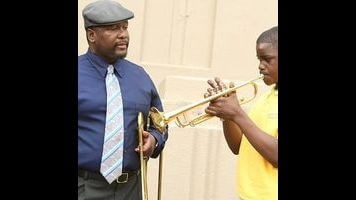Treme: "Wish Someone Would Care"

Hello. Keith Phipps sitting in for Scott Tobias this week, who’s off attending a party limited to musicians and beautiful women. He picked a hell of an episode to leave me with, too. The Wire always packed a lot of incident into each season’s penultimate episode, a writing slot traditionally handed to the great crime novelist George Pelecanos, who takes those duties here. The Wire also tended to use these episodes to bring every plot strand to the brink of conclusion, if not wrap it up. But Treme—as everyone has noticed by now, I’m sure—isn’t The Wire. It’s less about plots than the way lives bump up against one another in a richly detailed environment in a troubled time. The sorts of stories Treme tells don’t lend themselves to conclusions quite as easily as crime stories. Or, put another way, “There is no closure in life. Not really.” But sometimes there are endings. (Spoilers follow right away, so any casual readers might want to come back in a bit.)
I had a feeling John Goodman’s Creighton Bernette wouldn’t make it out of the season alive when I learned he was inspired by a real-life New Orleanian professor and blogger named Ashley Morris who died in 2008. I’m unclear on the cause of Morris’ death or any relation it might have had to post-Katrina depression, but as the season progressed it became clear that Creighton wasn’t doing well. [Update: Found Morris' obituary here. He died in his sleep.] Creighton was, to use an unavoidable choice of words, sinking. His anger had changed from red to black. Even Mardi Gras gave him no pleasure and he started to think of New Orleans’ future as a postscript to the real history that had come before. And his novel? It wasn’t going anywhere either.
Yet as convinced as I had become that Creighton would die, I wasn’t sure he’d commit suicide until this episode’s second classroom scene, as he waxed rhapsodic about the finale of Kate Chopin’s The Awakening. “The ending of the book is not the end,” he says. “It is a transition.” After a day experiencing New Orleans for the last time, and enjoying a first cigarette after a long stretch of abstaining, he follows the example of Chopin’s heroine and drowns himself. (The sequence seemed inspired at least in part by Spalding Gray’s suicide.)
I don’t want to make light Creighton’s suicide in any way, but it seems like the act of a man who's forgotten he’s not the protagonist of a novel. He leaves behind not just the city he loves after supping in its pleasures one last time, but a wife and daughter who will be devastated by his choice. However much his death would work narratively were he to write it for himself as a character, he’s in an ensemble piece, not a solo act. Suicide is an inherently selfish act and, this deep in the season, I felt like I knew Creighton's family well enough to be offended by his choice.
But in the logic of the show, he had to die. As the season progressed, Creighton’s bottomless anger has seemed less and less like the voice of Treme, which is ultimately more about the hard work of renewal than the inviting trap of despair. Creighton couldn’t see a future beyond the tragedy of Katrina and the quagmire of its aftermath. He contrasts sharply with Albert, indefatigable in the face of police harassment as he sews away on a costume for St. Joseph’s Night, a celebration that will have to make up for his missing Mardi Gras. “Every year we’re working on a better vision,” he says. And the year after the devastation should be no exception.
 Keep scrolling for more great stories.
Keep scrolling for more great stories.
